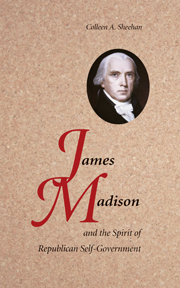Book contents
- Frontmatter
- Contents
- Acknowledgments
- List of Abbreviations for Sources
- Preface
- Introduction: Madison's Legacy
- 1 Republican Opposition
- 2 The Federalist Agenda
- 3 Madison and the French Enlightenment
- 4 The Commerce of Ideas
- 5 The Politics of Public Opinion
- 6 Madison and Jefferson: An Appeal to the People
- 7 The Spirit of Republican Government
- Epilogue: The Philosopher's Stone and the Poet's Reprise
- Bibliography
- Index
- References
6 - Madison and Jefferson: An Appeal to the People
Published online by Cambridge University Press: 05 June 2012
- Frontmatter
- Contents
- Acknowledgments
- List of Abbreviations for Sources
- Preface
- Introduction: Madison's Legacy
- 1 Republican Opposition
- 2 The Federalist Agenda
- 3 Madison and the French Enlightenment
- 4 The Commerce of Ideas
- 5 The Politics of Public Opinion
- 6 Madison and Jefferson: An Appeal to the People
- 7 The Spirit of Republican Government
- Epilogue: The Philosopher's Stone and the Poet's Reprise
- Bibliography
- Index
- References
Summary
On March 28, 1797, James and Dolley Madison began the journey from the United States capital at Philadelphia to the Madison family home at Montpelier, Virginia. Three and a half weeks earlier, on March 4, Thomas Jefferson had taken the oath of office for vice president of the United States. Though Jefferson originally contemplated not traveling from Monticello to Philadelphia for the inauguration ceremonies, perhaps because he thought the office as “insignificant” as Adams had, he ultimately decided to make the trip out of respect for the public, as well as to dismiss reports that he considered the second station beneath him. Jefferson and Madison were now trading places. Madison had remained on the scene of national politics and at the helm of the Republican Party throughout the Washington administration, while Jefferson had resigned his post as secretary of state in the second term and resettled in Virginia. Now it was Madison's turn to return home. Finally, he could devote his attentions to the woman he adored, his wife of only three years. Adding color and vivacity to his life, Dolley Payne Todd Madison had changed her husband from a reticent bachelor to a man at ease with domestic life. Gone were the late nights poring over ancient musty texts in a rented room more than 200 miles from home. Gone was a life dedicated almost exclusively to philosophy and politics.
Despite his elevation to the second highest office in the nation, Jefferson too expected extensive periods of domestic quiet.
- Type
- Chapter
- Information
- James Madison and the Spirit of Republican Self-Government , pp. 124 - 155Publisher: Cambridge University PressPrint publication year: 2009



